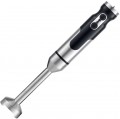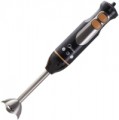Grinding bowl
The working volume of the grinding bowl, supplied with the device.
For more information about the bowl for grinding, see "Capacities". And the amount of product that can be grinded in the device in one load directly depends on its volume. At the same time, keep in mind that a larger bowl takes up more space, costs more, and also requires a more powerful engine. Therefore, manufacturers usually select this volume taking into account the overall level and performance of the device.
Power
The rated power of the device, in fact, is the power of the engine installed in it.
The higher this indicator, the more performant this model is, the more suitable for “heavy” work and the more applications can be provided in the design. For example, in the case of mixers (see “Appliance type”), a power of up to 250 W is considered good for liquid products; for more solid tasks, like kneading tough dough, you should pay attention to more powerful models. Detailed recommendations on optimal power can be found in special sources.
Note that powerful devices are usually equipped with more durable nozzles that can withstand high loads.
Main bowl material
The substance that the jar of the countertop blender is made of (refer to "Device type"), or the material of the blender attachment (refer to "Nozzles"). The most widely used materials are:
—
Plastic. Plastic is a popular choice for blender jars due to its low cost, lightweight, and sufficient strength for kitchen use. Its transparency allows for easy monitoring of the product being blended. However, plastic is prone to scratching, which can cloud the bowl and reduce the device's appearance. Scratches can occur from everyday use or rough cleaning with abrasive products.
—
Glass. Glass blender jars are transparent and allow for easy monitoring of the contents. They are more resistant to scratches than plastic and do not lose transparency during use. Cleaning them harshly does not affect their transparency, and any cloudiness can be easily removed. However, glass is heavier, more expensive than plastic, and is more sensitive to impacts. A glass blender jar can break from a fall that plastic could withstand.
— Metal. Metal blender jars are durable and stylish, often surviving falls without damage. However, they are less convenient than plastic because their opaque walls make it difficult to observe the blending process. Metal is also more expensive than plastic, making it less commonly used, mainly in high-end devices.
Hanging hook
Hook or loop device for hanging the appliance on the wall. In some cases, storing the appliance in this way is more convenient than in a box or kitchen cupboard. Hanging hooks are mainly used for smaller hand blenders.
Weight
The weight in this section can be confusing, since manufacturers do not indicate the mass of the main working tools of the equipment. Accordingly, the greater the number of accessories in the kit, the greater the total weight and this parameter will be necessary only at the time of purchase in order to understand how many extra kilograms you will have to carry home.

